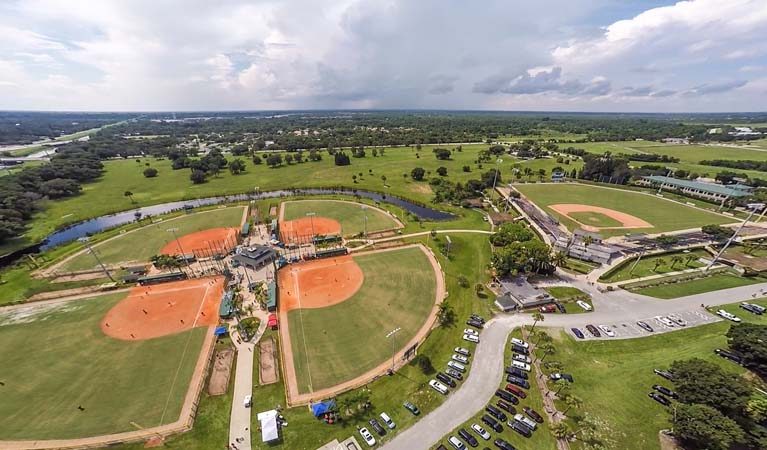
Among the still-unresolved issues in the county’s efforts to convince Major League Baseball to take over operations at Historic Dodgertown is how much each side will contribute to renovate, upgrade and maintain the aging facility.
It needs it more than most people realize.
“Part of any deal we have with Major League Baseball is going to include who’s paying for what,” County Administrator Jason Brown said during a Vero City Council meeting last month, where the city rejected the county’s $2.4 million offer to buy the former Dodgertown Golf Club property adjacent to the sports complex.
“I will acknowledge there are some deferred maintenance items there, and the county is going to be responsible for a significant portion of that in the deal,” he added. “But Major League Baseball is saying the place has to be up to Major League Baseball’s standards before they run anything there.”
Apparently, that will take considerable work.
Several residents who spoke at that same meeting criticized the county’s failure to properly maintain the complex, where roofs need to be replaced, soffits are peeling, ceilings are sagging, a wooden stairway is in disrepair, water fountains are rusting, mold grows on the sides of buildings, and sections of Holman Stadium are blocked off for safety reasons.
“A number of us were surprised by the comments made by the gentlemen who said it’s in bad shape,” longtime Vero Beach resident and retired realtor Cliff Norris said at the meeting.
Among those who exposed the county’s poor maintenance of Historic Dodgertown was Terry Borcheller, the professional sports-car racer and Vero Beach resident who, along with Lakeland-based builder Mark Hulbert, wanted to buy and develop the long-idle, golf-course property.
He said he recently drove through the complex and took photographs of conditions he described as “dilapidated” – so much so that he warned the county could “end up in a lawsuit” if a visitor gets injured.
“A coat of paint does a lot of good, but I don’t know how many more coats of paint they can put on over there without having some maintenance,” Borcheller told the council. “I’m telling you: It’s embarrassing, what the place looks like.
“That’s not the Dodgertown I had envisioned,” he added, “and I hope the county takes the money it was going to spend to buy this [golf-course] property and puts it into Dodgertown, because it needs it.”
He closed by saying, “People want to be proud of that place, but the way it looks right now, it’s a mess.”
Jason Redmon, vice president of the local Cal Ripken youth baseball league, echoed Borcheller’s remarks. He also questioned the sincerity of Major League Baseball’s interest in Vero Beach and challenged the county’s sentimental rhetoric about Historic Dodgertown.
“Why is Major League Baseball all of a sudden interested in Vero Beach again?” Redmon said. “It’s not because of Dodgertown. Look at the pictures.
“You want to create that nostalgia? You’re protecting it? Then why does that place look the way it does?” he continued. “You should be embarrassed. I’m embarrassed. I won’t take my kids there anymore.”
Vero Beach Vice Mayor Lange Sykes, who said he had seen recent photographs of Historic Dodgertown, called the conditions “pretty poor,” adding “there are a lot of improvements that need to be made.”
Reached by phone last week, Brown said the county is aware that some roofs need to be replaced and other maintenance work is needed, but he disagreed with claims the facility was dilapidated and deteriorating.
He said “limited financial resources” during the recession years prevented the county from funding some repair and maintenance projects at Historic Dodgertown.
“We were having problems maintaining other county facilities as well,” Brown said. “I remember reading about ambulances breaking down. But now that things are improving, financially, we’re playing catch-up.
“This isn’t where we wanted to be,” he added, “but we’ll get the place back in shape.”
Also delaying some of the repairs was the failure of the multi-sport complex to turn any significant profit for a number of years – money that Historic Dodgertown CEO Peter O’Malley, whose five-way partnership has operated the place since 2011, said would be reinvested in the facility.
It wasn’t until 2016 that Historic Dodgertown broke even.
“We had hoped for some different things,” Brown said, “but it took a while for them to break even, and the profit they’re producing hasn’t been enough.”
O’Malley, 80, began talking to Major League Baseball officials last year in hopes that they would take over Historic Dodgertown’s operations and possibly make it the hub of the game’s inner-city youth program.
After Major League Baseball expressed some interest, O’Malley turned over the negotiations to the county. Brown said the two sides are “getting close” to an agreement, adding “I think we can get to a place that could be beneficial to both parties.”
Brown told the City Council that if negotiations with Major League Baseball fail, the county could put up a “For Sale sign” on the 72-acre Historic Dodgertown property.
If that happens – if Historic Dodgertown shuts down when O’Malley’s lease expires in May – County Commission Chairman Peter O’Bryan said the local economy would lose the $15 million per year in “direct spending” generated by the complex’s operations.
Brown said Major League Baseball is willing to maintain Historic Dodgertown’s facilities “in a first-class manner,” if the county makes the financial investment necessary to bring those facilities up to the Major League Baseball’s standards.
“I’d say Major League Baseball will maintain it better,” Brown said, “probably better than we maintain a lot of facilities in the county.”



